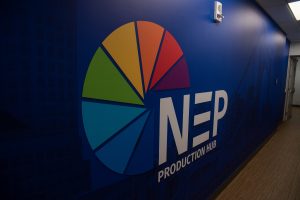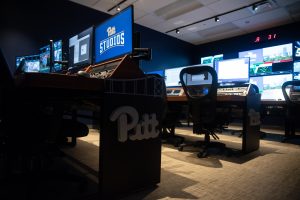NEP Group Establishes New Education Initiative at Pitt
The partnership aims to train and nurture broadcast pros
Story Highlights
Earlier this month, NEP Group partnered with the University of Pittsburgh to implement two educational initiatives in an effort to create opportunities for students interested in all facets of the Sports Broadcast business and to benefit the industry at-large. The initiatives include a new broadcast studies class through the university’s Film and Media Studies program, and NEP’s participation in a new co-op work study program through the Swanson School of Engineering.
For NEP US President Glen Levine, the school’s proximity to NEP’s facility made for a perfect fit.
“As we started to explore [the relationship], we learned that they knew so little about us and we’re only 15 minutes away. Being right in their backyard was a pleasant surprise for them,” he said. “Their enthusiasm and energy behind moving this forward was a huge part in us forming this public-private partnership.”
The Educational Aspect
Before putting the project into motion, the university needed to commit to creating a broadcasting curriculum that could teach students the basics of the industry.

The NEP Production Hub will help the NEP-Pitt partnership teach the next generation of broadcasting professionals.
“We have to grow a group of students that we can get involved directly with the broadcasts. Kelly Hammonds [Assistant Athletic Director of Broadcast and Video Production] had attended Pitt and there was no broadcast curriculum offered then,” said University of Pittsburgh Associate Athletic Director of Broadcast and Video Production Paul Barto. “That was the first thing we were both dedicated to because we wanted to bring that piece to life.”
In order to achieve this phase of the plan, Barto reached out to fellow schools in the ACC and others in the SEC for advice. “Most of our questions to other schools were about their student programs and whether or not they had a curriculum,” he said. “If they didn’t, how were they accessing students and if they did, how did their curriculum work.”
The first step in turning Barto’s findings into action was recruiting the university’s Director of Film and Media Studies Randall Halle to kickstart the process of developing a broadcasting program.
“While I was exploring how to expand professional experience for my production students, I was met with simultaneous inquiries from Kelly and Paul since they were looking for training opportunities and curriculum. It was a match made in the stars,” Halle said. “Now, I’m oriented toward building an interdisciplinary program in broadcast that reaches across schools and will serve the interests of students, athletics, and academics.”
With the framework set for classroom instruction through Halle’s program starting in Spring 2019, Barto set out to develop a way to give students real world training and work-study opportunities.
“You can sit in a classroom and you can talk theory all day. There’s absolutely nothing wrong with that,” he said. “However, when you walk out of the door without any real experience, you’re going to start off at the bottom of the ladder. You can teach students and young professionals the finer points from a book, but at the same time, from day one, you have to find a way to get them involved in production.”
Pitt is embracing its newly created curriculum and facilities to support it. “The University gave us a personalized education grant to hire three student interns that we placed in a different discipline (engineering, live production, and post production). For example, our engineering student has spent 20 hours a week with [Pitt Director of Broadcast Engineering] Liam Sporrer and NEP’s engineers while they’re working through integration and solving problems.”
The Local Connection
The NEP-Pitt partnership is grounded in availability and accessibility. Situated closely within the city of Pittsburgh, NEP and the university have opened their doors to allow a back-and-forth pipeline of knowledge.
“The new Pitt Studios and NEP Production Hub now present a great opportunity to serve as a lab of sorts — giving students the ability to work in all of the operating and engineering positions on live productions,” Levine said. “The reverse of that is, Pitt can also send their students to our field shop to spend time with our engineers and technicians to learn in the work environment.”
The Future of the Industry
Barto and Levine envision the partnership to be mutually beneficial.
As an institution that is just getting started, the co-op and internship opportunities for students can help propel them into meaningful roles after graduation. “[NEP] understands that there’s a bit of a generational gap between the people who are retiring and young people,” Barto said. “My hope is that we can impact the industry simply by turning out class after class of highly qualified and experienced people. I think having the connection to NEP is going to be huge in getting that done.”
As a company, it’s all about nurturing, growing, and curating the next wave of professionals. “We’re teaching our youth and we’re giving them the opportunity to learn in the real world,” said Levine. “We’re hopefully training broadcast engineers for NEP, plus other broadcast professionals for the networks and production companies in our industry. In turn, the school gets to grow a program. It’s a win all around.”

